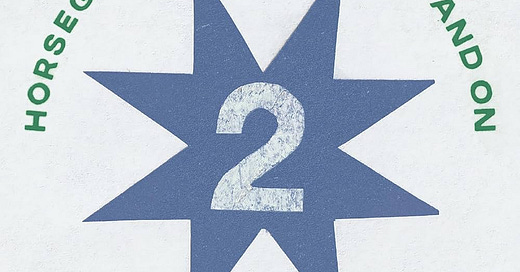An eight-sided star colored a muted periwinkle sits upon a plain white background, with a big, fat number two in the middle. Even in its visual accompaniments, the sophomore album of Chicago trio Horsegirl, Phonetics On and On, presents as a pared-back sequel to the band’s now three-year-old debut.
Looking back at where Horsegirl was at the release of their last album, 2021’s Versions of Modern Performance, the album’s juvenile angst is contextualized by its time. It’s filled with motor-driven indie rock—likened to fellow Chicago natives Lifeguard, who were signed to Matador around the same time—with shoegaze tendencies, as shown off by the album’s instrumental tracks “Bog Bog 1” and “Electrolocation 2.” Modern Performance sounds like the inside of a teenager’s brain, addled with TikTok edginess and fried to shit by a pedal board.
It only makes sense that after three years experiencing the throes of late-teenagerhood and the early twenties, plus the coming-of-age that beginning college brings, that their sound developed to match that energy. In comparison to Modern Performance, Phonetics On and On is more grown-up. Through all the trials and tribulations of coming into adulthood, members Nora Cheng, Gigi Reece, and Penelope Lowenstein learned one of the most important life lessons of all (and perhaps one that others ought to too): not everything needs to be shoegaze.
Modern Performance’s fuzziness is traded for a touch of twee on Phonetics, similar to the Marine Girls, Mirah, or Electrelane. Themes of maneuvering relationships are ever-present, as well as the girlish whimsy brought to life by onomatopoeia in nearly every song—from “oooh”s and “la-di-da”s to the rhythmic repetition of “switch over / switch off.” When angst is shed, the playfulness in the songwriting process shines clearly, assisted by the modern queen of indie pop, Cate Le Bon, who produced the record at Loft Studio in Chicago.
One of the album’s early singles, “2468,” exemplifies this perfectly. Opening with guitarist/vocalist Cheng playing the violin. It sounds amateur, and that’s because it is: Cheng played violin as a child and revisited it for the album. When the vocals hit, they’re monotone with little care for melody, like a nervous soloist at an elementary school concert. The lyrics come off like a nursery rhyme: “2, 4, 6, 8, da-da-da-da-da-da, they walk in twos.” Who walks in twos, exactly? It doesn’t even matter. What matters is that they’re having fun playing and you’re having fun blasting it in your headphones during your commute.
All in all, a beautiful celebration of girlhood and a sweet, 40-minute foray into whimsy. Perhaps this will be some Gen-Alpha teenager’s Kimya Dawson.





